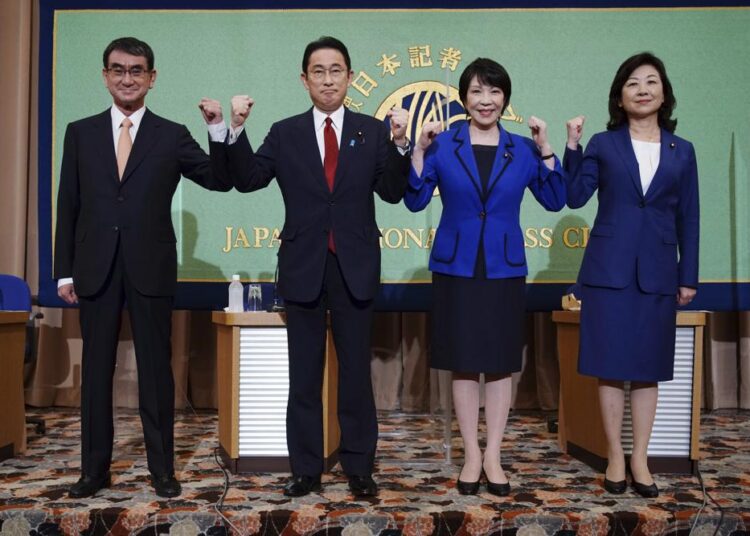TOKYO — The stakes are high as Japanese governing party members vote Wednesday for four candidates seeking to replace Yoshihide Suga as prime minister. The next leader must address a pandemic-battered economy, a newly empowered military operating in a dangerous neighbourhood, crucial ties with an inward-focused ally, Washington, and tense security standoffs with an emboldened China and its ally North Korea.
For the long-governing Liberal Democratic Party that often chooses its leaders in backroom negotiations, this election promises to be wide open. Because of the party’s control of parliament, its leader will become prime minister.
Whoever wins, the party desperately needs new ideas to quickly turn around plunging public support ahead of lower house elections coming within two months, observers say according to AP.
Unusually, two women — conservative Sanae Takaichi and more liberal Seiko Noda — are competing against front-running Taro Kono, the vaccinations minister, and former Foreign Minister Fumio Kishida.
Takaichi, with the crucial backing of Suga’s predecessor, former Prime Minister Shinzo Abe, whose conservative vision and revisionist stance she supports, has risen fast, while Noda’s chances are fading.
Abe’s backing of Takaichi may be divert votes from Kono, considered something of a maverick and a reformist, political watchers say.
Little change is expected in key diplomatic and security policies under the new leader, said Yu Uchiyama, a political science professor at the University of Tokyo.
All of the candidates support close Japan-US security ties and partnerships with other like-minded democracies in Asia and Europe, in part as a way to counter China’s growing influence.
Kono and Kishida are former top diplomats. They and Noda have stressed the need for dialogue with China as an important neighbour and trade partner. All four candidates support maintaining close “practical ties” with Taiwan, the self-governing island that China claims as its own, and its intention of joining the Trans-Pacific Partnership trade bloc and other international organisations.
At a series of policy debates, the four candidates discussed diplomacy, the economy, energy and defence issues, but also gender equality.
Inclusion of gender and diversity signals that the party knows it cannot keep neglecting the issues, said Ryosuke Nishida, a sociology and public policy professor at the Tokyo Institute of Technology.
Takaichi alone opposes changing a law that forces married couples to use only one surname — almost always the husband’s. She also has vowed to make official visits to Yasukuni Shrine, which honors World War II dead, including war criminals, and is considered by many in China and the Koreas as proof of Japan’s lack of remorse over its wartime actions.
The other candidates are likely to refrain from visiting Yasukuni because of the fallout in relations with China and South Korea.






Discussion about this post